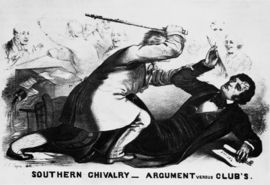On Civility in the Midst of Disagreement
Last week was not one of the greatest weeks in the annals of American History. On Tuesday the President delivered his State of the Union Address to a joint session of Congress. Beyond the pageantry of the event, State of the Union speeches are often forgotten soon after they take place. The event is largely ceremonial, with the day in an day out grind of governing taking place in other venues.
Last week's event was more noted for two exchanges surrounding the event rather than the actual contents of the President's remarks. The first occurred when President Trump refused to shake the hand of House Speaker Nancy Pelosi when offered. The second occurred upon the conclusion of President's speech when the Speaker ripped her copy of the President's speech into pieces.
It would be imprudent in this blog to pass judgments on the actions of the two participants . Suffice to say, the actions are indicative of the rampant divisiveness that is taking place in our nation. It seems that our society is devolving into a tribal state with each side ready to pummel the other for any perceived slight.
Social media does not calm these passions. Instead the incivility drips in abundance from Twitter accounts, Facebook posts and other platforms. The fact that much of the information that is bandied about in these forums is inaccurate is almost irrelevant. There is an incredible rush to see who can say the worst things about those who have differing viewpoints.
Due to the proliferation of these social media platforms it is rather difficult to tell if our society is more divided now than ever or that we simply have more people stating their opinion with their opinions being inflamed by the pundits of cable television news, political talk radio and quite frankly, the tenor of comments from our own political and governmental leadership.
The good news is that today we aren't having riots in the streets as we had in the 1960's. We certainly are not seeing states secede and sides being chosen for a civil war. A cursory glance at the record reveals that there have been more divisive times in our history. Even the events that took place on Capitol Hill last week were rather mild compared to some things that have taken place on those grounds.
On of those took place in 1856. In 1856, tensions were running high in our country over the issue of slavery. No where were those tensions higher than in Kansas, where pro-slavery settlers from the south often clashed with anti-slavery settlers from the northern states. Armed battles between the two sides were not uncommon.
After a particularly violent confrontation in Lawrence, Kansas in May of 1856, Senator Charles Sumner, an abolitionist Republican Senator from Massachusetts, made a virulent speech decrying the actions which he titled "The Crime Against Kansas."
The speech was highly critical of many opposition leaders particularly Senator Andrew Butler of South Carolina. Sumner went so far as to assert that the Carolinian had take "the harlot slavery" as his "mistress."
South Carolina Representative Preston Brooks was a relative of Senator Butler. Three days after Sumner's speech Brooks walked from the House side of the Capitol to the Senate side and into the Senate chamber. Brooks found Sumner sitting at his desk and said, "You've libeled my state and slandered my white-haired old relative and I've come to punish you for it."
With that Brooks began beating Sumner over the head with a cane. In fact, Brooks continued to beat Sumner for a full minute or more until the cane broke.
Sumner was left bleeding profusely while Brooks calmly walked from the Senate floor.
Northerners were irate. Though Sumner was unable to return to the Senate and perform his duties after the beating, the people of Massachusetts re-elected him and left his seat empty in an act of defiant protest. After many years Sumner returned to the Senate and became a spokesman for the radical wing of the Republican Party after the Civil War.
The House of Representatives considered a motion to censure Brooks but could not muster the support to do so. Brooks resigned his seat in Congress and returned to South Carolina where he was hailed as a hero. He then ran for re-election to the seat he had surrendered and was elected without opposition. He only served in Congress for a short time after the incident as he passed away in 1857,
Our incivility has not yet reached those proportions. However, merely finding a worse example of our incivility does not excuse our current climate.
In the fifteenth chapter of Acts we see a very concrete example of how followers of Jesus Christ are called to settle their differences. The early church had a major disagreement. The question before them was should the Gentiles who were converting to the Christian faith be required to follow Jewish laws concerning diet and purity.
Rather than tumbling into violent conflict the leaders of the church sat down in Jerusalem and had a discussion. Each side stated its case. Acts says there were points made for both view points. I am quite certain the meeting was surrounded by prayer. In the end, there was agreement.
This event serves as model for settling disputes for those with opposing viewpoints. There is a great truth that is seen in Acts. We will not always agree. Agreement is not the test of our character or the character of those with whom we disagree. Rather the test of our character comes in how we respond to those with whom we have disagreements.

An 1856 political cartoon depicts Brook caning of Sumner. (Source U.S. Senate website)
Comments
Post a Comment